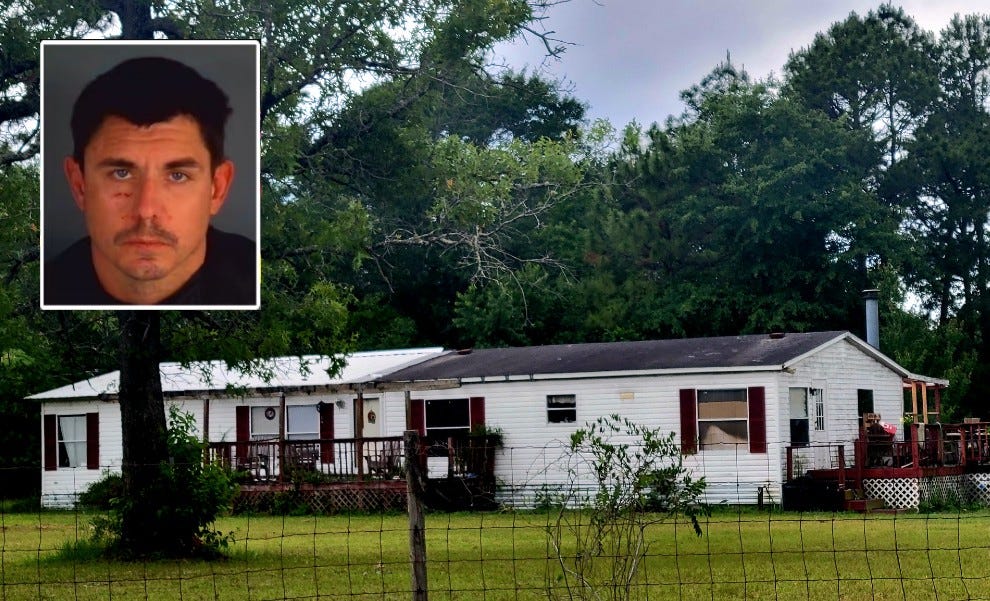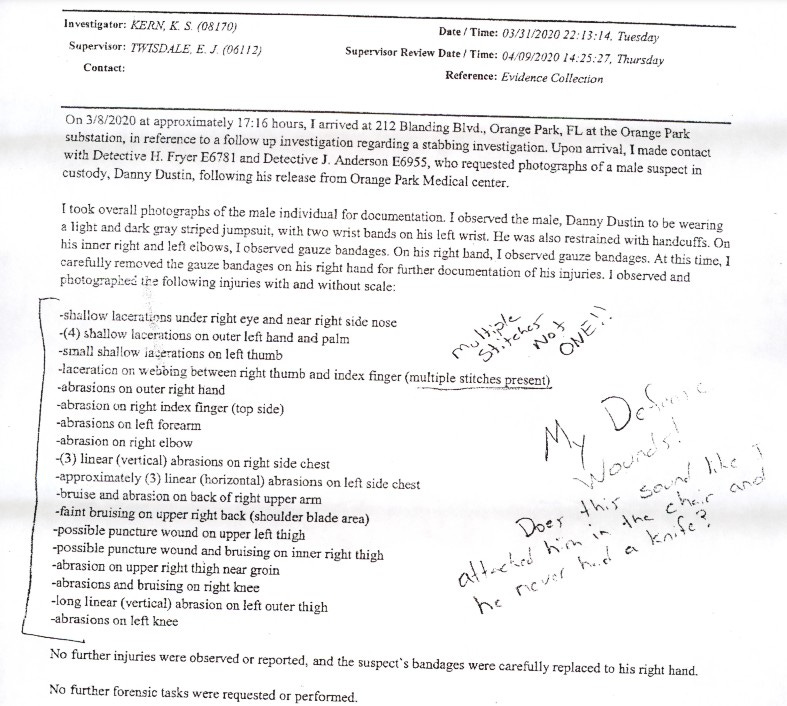Litigator of the Year, Based on Volume
Danny Dustin Is Making His Mark on the Courts, But Can He Establish Reasonable Doubt?

There’s a new litigator in Clay County, and he has likely set a record for the volume of business that he has brought before the courts over the past four years.
Since 2020, this guy has filed 14 lawsuits in the circuit court, seven of which are still open. He’s filed 17 suits in federal court, two of which are open. And he has eight cases before the Florida Fifth Circuit Court of Appeals, three of which are open. And the Florida Supreme Court has also considered some of his pleadings.
Danny Dustin, 42, is no lawyer. You might say his legal career began on March 6, 2020 when a bloody brawl at 1972 Wren Lane in Middleburg left Dustin’s father dead from stab wounds, and Danny Dustin charged with second-degree murder. He’s been living in Clay and Duval county jails ever since as he awaits trial, now scheduled for September.
Dustin has fired four or five of his court-appointed defense attorneys—it’s hard to keep track in the more than 300 entries on his criminal docket. In between real lawyers, Dustin has been a prodigious filer of motions on his own behalf, and not limited to arguments related to his criminal case but separate lawsuits claiming mistreatment at the jails.
In February, for example, Dustin and a couple of other pre-trial detainees filed suit accusing Sheriff Michelle Cook and her jailers of feeding them diarrhea-inducing “Alpo” then denying them sufficient toilet paper to deal with the results. “Cruel and unusual punishment,” said Dustin et al.
Further alleged cruelty includes limiting TV privileges to channels “that show us how to make camel milk and find Bigfoot.”
Confiscation of razors has meant that having to attend court hearings unshaven “and we are forced to have visits at the kiosk with our families looking like homeless scrubs,” he wrote.
Battles over toilet paper and the like shouldn’t distract from the reality that Dustin may be making real progress in his case. His defense has been two-fold: He killed dad in self-defense and police lied about evidence against him.
So far, Dustin has failed to have charges dismissed based on Florida’s “stand your ground” law, though self-defense surely will be argued at trial. Meanwhile, Judge James Kallaher may yet grant him a so-called Franks Hearing to exclude evidence gathered because of a warrant based on false or misleading information.
He has cited a bunch of case law, legal precedents that he believes support his position—so he is not just arguing the facts, but the law, too. Here is an example of Dustin’s legal prose from one of his most recent filings:
It would be with ignorance to think that purposely lying on a warrantless arrest affidavit about probable cause to secure an arrest would hold any difference than lying on an application or to the judge in person. It would also go without saying that an officer that signs a warrantless arrest affidavit to be sworn and true is not at liberty to omit statements that the judge should have informed of to establish probable cause, to search and detain a person…Detective Anderson deliberately fabricated an arrest affidavit with malicious intent to sabotage my right to claim self defense.
Dustin was successful in forcing prosecutors to exclude statements made by him to investigators while he was in custody at Orange Park Medical Center. He had not yet been read his Miranda rights.
Representing himself, Dustin conducted a deposition of Sgt. Jeffrey Anderson, in which he elicited answers that contradicted what Anderson had written in the original arrest report. Anderson admitted that he could not say for certain who struck the first blow at the Dustin house, nor could he say for certain whether father or son had picked up a knife first.
For those who do not want to read the Arrest and Booking Report above, this is a summary: Dustin had been drinking. He and his 73-year-old father had been arguing all day, including dad insulting Dustin’s dead girlfriend. A fight ensued involving three knives. Dustin dialed 911 to ask for help, and when deputies arrived they found Richard Dustin dead and Danny Dustin foaming at the mouth and covered in blood.
Somehow the lead-up to the bloody struggle had been broadcast on Facebook.
The news coverage of the killing all focused on police statements that Richard Dustin had been stabbed more than 20 times, but the Medical Examiner’s Report corrected that to 13 with only three being serious, including the one that punctured the elder Dustin’s jugular vein and killed him.
At the same time, Dustin is using the physical examination conducted after his arrest to suggest that his own injuries were defensive wounds suffered at the hands of his father.
If convicted of second-degree murder, Dustin could face up to life in prison. His goal as born-again lawyer has been to collect evidence that will sow reasonable doubt in the minds of jurors. Alternatively, even if he can’t convince them that he killed in self-defense, he might succeed at getting the jury to convict him of manslaughter instead, a lesser offense (as he has himself suggested in pleadings).
Dustin has prior convictions for assault and drugs. In the process he likely developed an ex-con’s savvy understanding of the legal and correctional systems. A manslaughter conviction would probably result in a sentence of at least nine years, possibly minus time served in county jails while awaiting trial. Dustin’s legal maneuvers could be partially intended to maximize county time and minimize inevitable state prison time.
Dustin turned that concept on its head in his toilet-paper lawsuit, when he and his co-plaintiffs accused jailers of not making life comfy enough for pre-trial detainees. “This is a psychological and emotional assault and deprivation to get us to sign onto sentences we don’t deserve to get better treatment in the Department of Corrections,” Dustin wrote, perhaps ironically.




When you do an update to this article make your you add the old saying person represents himself in the court has a fool for an attorney
By my observation, Daniel is a narcasistic sociopath who slaughted his father. Daniel suffered barely superficial wounds. Daniel's worse wound on his hand appeared to have resulted when his knife slipped on his own hand while wailing away on his dad. Besides the fatal wound on his dad to the jugular, one of the knife woulds went through his dad's neck and came out his cheek. To make all of the matter worse, Daniel left a fork in his dad's head.
Sadly, it looks like, this low-life keeps the courts busy these last 5 years, costing the county, our tax payer monies, on these many frivious laws suits. He needs to be stopped.
The lawyers did a excellent job proscecuting and the judge judicated the proceedings righteously.